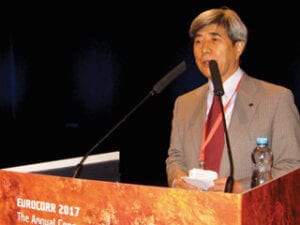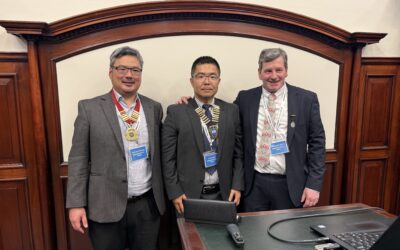This major conference, which this year was combined with the 20th International Corrosion Congress and the Process Safety Congress, was held from 3rd – 7th September 2017 in Prague, Czech Republic. It attracted 1200 participants from 62 countries, with the largest number coming from France, second was China, third was Germany, fourth United Kingdom and fifth the Czech Republic. There was a large exhibition, featuring a total of 49 exhibitors and this was opened on the Monday evening with a reception. In accordance with the traditional format, the conference was divided into parallel sessions, 43 in total, running concurrently. These included sessions organised by the various EFC working parties (details of these are available at http://efcweb.org/wp.html), various Joint Sessions, Technical Forums and Workshops, and six Process Safety sessions. The conference was opened by Tomáš Prošek (Czech Association of Corrosion Engineers and chief organiser) and Damien Féron (President of the European Federation of Corrosion). The European Corrosion Medal was then awarded to Mário G. S. Ferreira (University of Aveiro, Portugal) who gave a talk on ‘Immobilisation of active molecules in nano-structured materials for multifunctional coatings’ in which he argued that although additives can confer important functionalities (corrosion inhibition, anti-fouling, sensing, adhesion), the direct mixing of additives into coating formulations can have serious drawbacks.
The Marcel Pourbaix Award was presented to Christofer Leygraf (KTH Royal Institute of Technology, Sweden), who delivered a plenary talk on ‘Atmospheric corrosion: current challenges in an evolving research field’. The development of simplified but practically relevant model systems, along with international exposure tests and laboratory experiments aided by analytical and technical advancements has greatly increased our understanding of atmospheric corrosion. The speaker sought to highlight present and future challenges.
On the Wednesday morning the EUROCORR Young Scientist Grant award, which provides financial support to young corrosion practitioners to visit and interact with groups working in other countries, was presented to Hongchang Qian, who will work with Dr Yaiza Gonzalez-Garcia (Delft University of Technology, Netherlands); Anissa Célina Bouali, who will work with Dr Alexander Lutz (Vrije Universiteit Brussel, Belgium); and Berk Ozdirik, who will work with Dr Patrik Schmutz (EMPA, Swizerland). Details of this award can be found at http://efcweb.org/EUROCORR+Young+Scientist+Grant.html.
Prizes for the best posters were also presented, with first prize going to Alexander Lutz (Vrije Universiteit Brussel, Belgium) for ‘Local electrochemical study of ternary Zn–Fe–Mo alloy coatings on carbon steel’. The second prize going to Beatriz Mingo (The University of Manchester, U.K.) for ‘Active Functionalisation of ceramic coatings: incorporation of loaded nanotubes’, The plenary lecture on the Wednesday was ‘Continuum and atomic scale simulation of stress corrosion cracking and causality’ by Tetsuo Shoji (Tohoku University, Japan). The speaker described the application of stress and strain analysis by theoretical elastic-plastic stress field analysis and FEM, quasi-continuum (FEM and molecular dynamics) and Quantum Chemical Molecular Dynamics to examine the role of stress and strain in SCC in relation to the chemical and physical properties of materials.
The conference Gala Dinner took place on the Wednesday evening at the riverside Zofin Palace, with an extensive buffet of Czech specialities and drinks, presented in the numerous rooms of this impressive building including an upstairs and gallery. The multiple levels made it possible for a choice of two parallel entertainments, the spacious upstairs ballroom being entertained by the Havelka Sisters and their Orchestra with traditional light jazz and swing music, while the downstairs dance room was rocked by the Beatles Revival (Brouci Band) with their repertoire of Beatles hits.
On Thursday, the plenary lecture was given by John R. Scully (University of Virginia, USA) on ‘Needs, gaps and opportunities for better design of corrosion resistant materials’. The speaker cited a recent National Academy study suggesting that an ideal corrosion-resistant alloy might well be formulated in the future using integrated computational materials design. This presents the challenge of connecting the attribute-defined features of an alloy, with the subsequent properties, by applying relevant scientific principles. Significant scientific needs, gaps and opportunities must be met in order to improve this theory-based design approach
Next year the EUROCORR congress will be held from 9th to 13th September at the ICE Kraków congress centre, Poland.
The above is an edited version of a longer report that will appear in the first issue of 2018 of the journal Corrosion Engineering Science and Technology. Thanks are due to Ruth Bingham for supplying the two photographs.
Tetsuo Shoji (Tohoku University, Japan).
Beatriz Mingo
(The University of Manchester).



